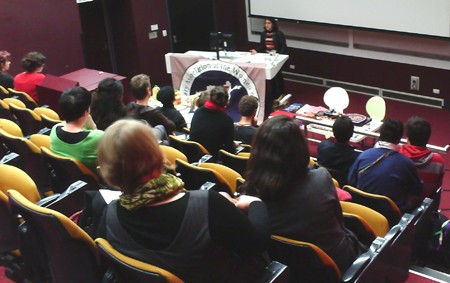By Virginia Haussegger

Shazia in a public meeting in Melbourne
What a strange place Australia must seem to Shazia Shakib. She arrived in Adelaide on Wednesday, having flown from war-torn Afghanistan, via Pakistan. She's 25 years old and has never been to "the West" before.
By the time this petite, young Afghan stands to face an audience at the University of South Australia, on Thursday night, she looks positively overwhelmed. This is to be her first public speech and the words she's about to say could get her killed back in Afghanistan.
I can't tell you what Shazia looks like because that would betray her identity and place her at risk. But I can tell you what she sounds like.
Shazia's voice is soft and small. Yet there is a fierce strength in her words. She means it when she calls the Taliban "poisonous germs", and refers to members of the Afghan Government as "criminal warlords" and "jehadi fundamentalists".
But it's when she gets talking about the United States and NATO occupying forces that Shazia's pitch rises. When I ask about Australia and its involvement in her country, this young revolutionary steadies the nervousness in her voice and remains firm. "Yes, Australia too," she says. "Australia must get out of our country. They are following bad US policy and Australian troops are attacking and bringing suffering to our people. They must go."
They're fighting words, and Shazia knows it. She is here to pick a fight. And now is the time to bring it on.
This November it will be eight years since US troops stormed into Kabul, raised the US flag, and President George W. Bush declared, "Today women are free." It was a grand and pretentious claim, which now looks like nothing but an empty slogan. A cynical bit of political spin to help drag the doubting public over the line, and get broad voter support for the billions of dollars and tens of thousands of troops that would be poured into Afghanistan.
The women of Afghanistan are not free or liberated.
We all know life under the Taliban was atrocious, but to hear Shazia say that Afghanistan's women are now living through a "catastrophe" that is even worse is startling.
Although accurate statistics are difficult to determine in Afghanistan, there is a lot of research on women that indicates record high levels of domestic violence, acid attacks, rapes, forced marriages and self-immolation. The rate of females attempting suicide by burning themselves has never been as high. Shazia puts that down to extreme depression and despair. "Life is too hard for women."
Yes, they are no longer confined to the home, as they were under the Taliban. And, yes, women are permitted to work and study. But a toxic cocktail of poverty, massive unemployment, rampant corruption and a desperate sense of frustration has led to what Shazia says is a major "violation of basic human rights and women's rights that has no parallel in the history of Afghanistan".
With warlords and drug barons now occupying government seats and positions of power, and enjoying immunity from prosecution, thanks to a "national reconciliation law", passed in 2007, the strong have grown stronger and the weak - the women - even weaker.
Shazia is a spokesperson for the clandestine and underground movement known as RAWA, the Revolutionary Association of the Women of Afghanistan. Hated and banned in Afghanistan, RAWA operates through a well-organized network of women throughout Afghanistan and in Pakistan. The group is fiercely anti-fundamentalist, and abhors the use of Islam as an excuse for the continued persecution of women. For the past 30 years it has called for a democratic and secular government in Afghanistan. But it's a call that continues to fall on deaf ears.
Now Shazia and her fellow revolutionaries are feeling particularly pessimistic. "After the US attack on the Taliban back in 2001 and the arrival of Hamid Karzai everyone was hopeful that there would be change," she says. "There was so much hope." But that hope has now turned to deep cynicism. RAWA believes the presence of more than 70,000 troops from more than 40 countries, and the billions of dollars spent, has only driven Afghanistan into the hands of the terrorist groups, including the Taliban.
Shazia isn't alone in arguing that Afghanistna's official ranks have been deeply infiltrated by self-serving corrupt individuals, including Taliban and those who RAWA calls "jehadi fundamentalists": men who are stuck in misogynist mire. "They do not believe in women's rights," Shazia says. "They have old and ancient ideas about women."
Although the last election in Afghanistan ushered 68 women into parliament, only three of them have ever spoken out strongly in defence of women's rights. Each has received several death threats.
So what does Shazia make of Australia? It's almost too embarrassing to ask. But I do. "There is so much freedom for the people here - we should be like this," she says almost in a whisper. "But no country can grant freedom or democracy to us. It is the responsibility of our people to bring peace and security to our country." So what do we do? Just wish them well?
* Shazia Shakib is not her real name.
Virginia Haussegger presents ABC television news in Canberra.



